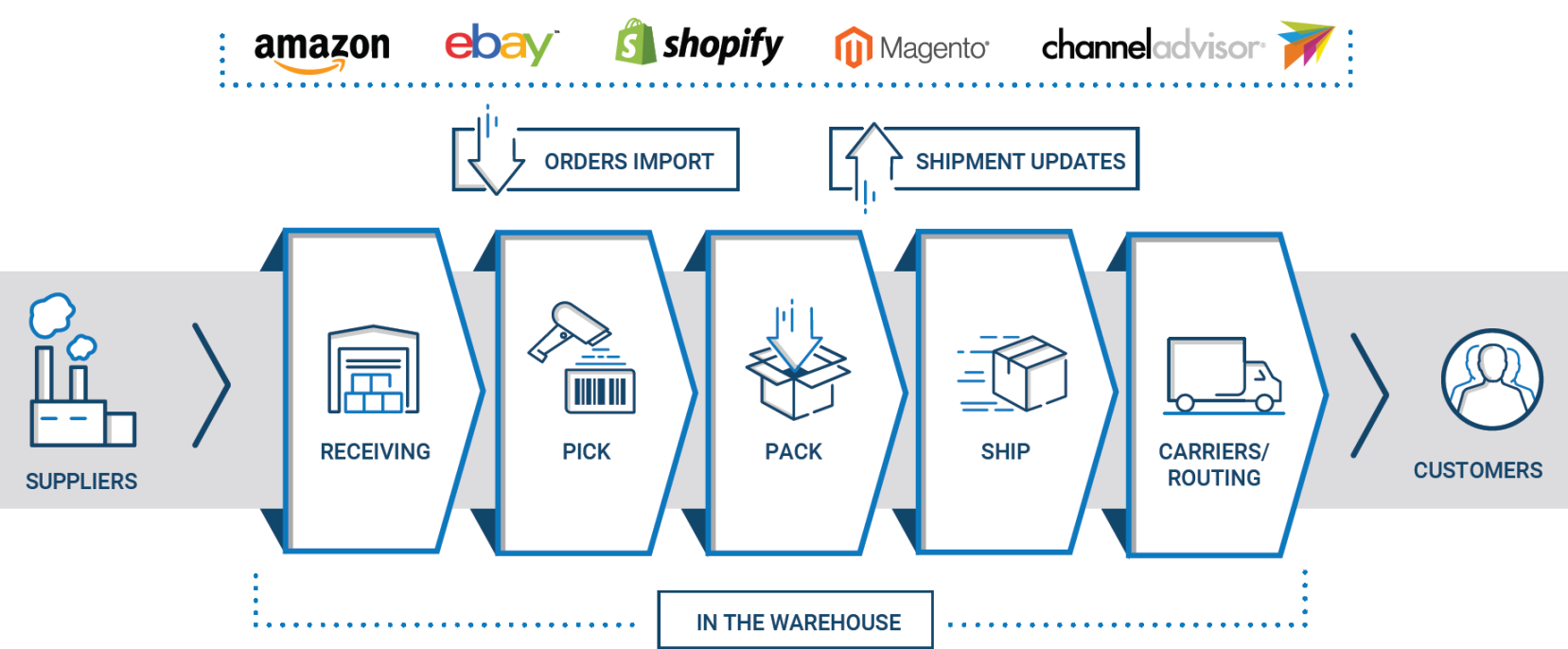E-commerce Warehouse Management Systems: Streamlining Operations for Online Retailers
What do you mean by E-commerce Warehouse Management Systems?
E-commerce Warehouse Management Systems (WMS) refer to sophisticated software solutions designed to optimize the storage, tracking, and fulfillment of products within an e-commerce warehouse. These systems offer real-time visibility into the inventory, enabling online retailers to streamline their operations, reduce errors, and enhance customer satisfaction.
How do E-commerce Warehouse Management Systems work?
E-commerce warehouse management systems leverage a combination of software, hardware, and automation technologies to efficiently handle inventory and order fulfillment processes. These systems integrate with other crucial components of an e-commerce ecosystem, such as online shopping carts, point-of-sale systems, and shipping carriers.

When a customer places an order on an online store, the WMS receives the order details and automatically initiates the picking process. Warehouse personnel use handheld devices or mobile apps to locate and pick the items from their designated storage locations. The system then updates the inventory in real-time, ensuring accurate stock levels for future orders.
E-commerce WMS also automate various warehouse tasks, such as replenishment, packing, and shipping. They optimize the order fulfillment process by suggesting the most efficient picking routes and packaging methods. Additionally, these systems can generate shipping labels and track the progress of shipments until they reach the customer’s doorstep.
What is known about E-commerce Warehouse Management Systems?
E-commerce warehouse management systems have gained significant popularity in recent years due to the exponential growth of online retail. These systems are known for their ability to streamline warehouse operations, improve inventory accuracy, and enhance overall productivity. They provide online retailers with valuable insights into their supply chain, allowing them to make data-driven decisions and improve customer service.
These systems offer comprehensive reporting and analytics capabilities, enabling businesses to monitor key performance indicators (KPIs) such as order accuracy, picking efficiency, and shipping speed. By tracking these metrics, retailers can identify bottlenecks in their operations and implement process improvements to increase efficiency and reduce costs.
Moreover, e-commerce WMS can integrate with other enterprise systems such as Enterprise Resource Planning (ERP) software, Customer Relationship Management (CRM) tools, and accounting systems. This integration facilitates seamless data flow between different departments, ensuring transparency and consistency across the entire organization.
Solution Provided by E-commerce Warehouse Management Systems
E-commerce warehouse management systems offer numerous solutions to the challenges faced by online retailers. Firstly, these systems automate inventory management processes, minimizing the risk of stockouts or overstocks. With real-time visibility into inventory levels, businesses can optimize their purchasing decisions and ensure product availability for customers.
Secondly, e-commerce WMS optimize order fulfillment processes by reducing manual errors and streamlining picking, packing, and shipping operations. By minimizing order processing time, retailers can improve order accuracy and customer satisfaction. Additionally, these systems allow for efficient utilization of warehouse space, maximizing storage capacity and reducing storage costs.
Furthermore, e-commerce WMS provide powerful reporting and analytics features that enable businesses to identify trends, monitor performance, and forecast future demand. By leveraging these insights, retailers can make informed decisions about inventory planning, staffing, and resource allocation.
Information about E-commerce Warehouse Management Systems
E-commerce warehouse management systems are equipped with barcode scanning capabilities, allowing for quick and accurate item identification during the picking process. Barcode scanning minimizes human errors and enables efficient inventory tracking.
Additionally, these systems support integration with shipping carriers, enabling automatic label generation and real-time shipment tracking. This integration improves order visibility, reduces shipping errors, and enhances the overall delivery experience for customers.
E-commerce WMS also facilitate returns and exchange processes by providing a centralized platform for managing customer returns. By streamlining these processes, businesses can reduce the associated costs and enhance customer satisfaction.
Conclusion
E-commerce warehouse management systems have revolutionized the way online retailers manage their inventory and fulfill orders. These systems offer a wide range of benefits, including improved operational efficiency, enhanced inventory accuracy, and better customer service. By leveraging the power of e-commerce WMS, online retailers can optimize their warehouse processes, reduce costs, and stay competitive in the ever-evolving e-commerce landscape.